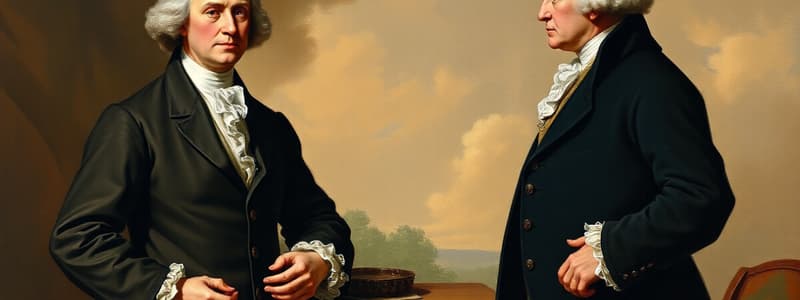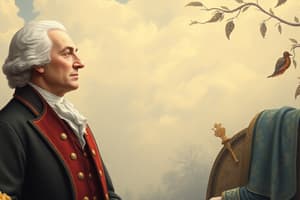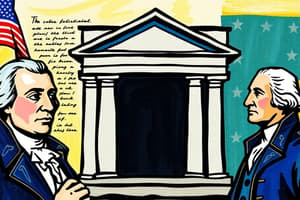Podcast
Questions and Answers
What was one of the key actions taken by Congress during President Washington's first term?
What was one of the key actions taken by Congress during President Washington's first term?
- Establish the Supreme Court
- Ratify the Bill of Rights
- Create the Treasury Department (correct)
- Grant voting rights to all males
Which of the following best describes Thomas Jefferson's view on power distribution?
Which of the following best describes Thomas Jefferson's view on power distribution?
- Power should remain mostly with state governments (correct)
- Power should be centralized in the federal government
- Power should be nonexistent to protect liberty
- Power should be shared evenly between federal and state governments
What was a major disagreement between Hamilton and Jefferson?
What was a major disagreement between Hamilton and Jefferson?
- Hamilton’s Financial Plan (correct)
- The creation of the War Department
- The approach to foreign diplomacy
- The establishment of the Supreme Court
How did Hamilton's financial plan propose to unify the states?
How did Hamilton's financial plan propose to unify the states?
Which tax proposed by Hamilton was approved by Congress?
Which tax proposed by Hamilton was approved by Congress?
What was one of the main reasons Hamilton argued for the establishment of the Bank of the U.S.?
What was one of the main reasons Hamilton argued for the establishment of the Bank of the U.S.?
Which political party did Thomas Jefferson form in opposition to Hamilton's views?
Which political party did Thomas Jefferson form in opposition to Hamilton's views?
Which crisis did George Washington address during his presidency that involved a tax on whiskey?
Which crisis did George Washington address during his presidency that involved a tax on whiskey?
What precedent regarding presidential terms did George Washington establish?
What precedent regarding presidential terms did George Washington establish?
What significant warning did Washington give in his Farewell Address?
What significant warning did Washington give in his Farewell Address?
Flashcards
George Washington's Presidency
George Washington's Presidency
George Washington, unanimously elected as the first president in 1789, played a crucial role in shaping the new nation and setting precedents for future leadership. He focused on domestic affairs, such as establishing the federal court system and forming the first cabinet of advisors.
Hamilton's Financial Plan
Hamilton's Financial Plan
Alexander Hamilton's financial plan, proposed in 1789, aimed to strengthen the US economy by assuming state debts, promoting American industry through taxes and tariffs, and establishing a national bank (BUS) to regulate finances.
Federalist vs. Democratic-Republican
Federalist vs. Democratic-Republican
The debate between Alexander Hamilton and Thomas Jefferson highlighted two contrasting visions for the new nation. Hamilton favored a strong federal government and a focus on industry, while Jefferson advocated for states' rights and an agricultural economy.
Funding and Assumption of State Debts
Funding and Assumption of State Debts
Signup and view all the flashcards
The Bank of the United States (BUS)
The Bank of the United States (BUS)
Signup and view all the flashcards
Whiskey Rebellion
Whiskey Rebellion
Signup and view all the flashcards
Proclamation of Neutrality
Proclamation of Neutrality
Signup and view all the flashcards
Federalist Party
Federalist Party
Signup and view all the flashcards
Democratic-Republican Party
Democratic-Republican Party
Signup and view all the flashcards
Washington's Farewell Address
Washington's Farewell Address
Signup and view all the flashcards
Study Notes
The Presidency of George Washington (1789-1797)
- Washington was unanimously elected the first president in 1789.
- He played a crucial role in shaping the new nation and setting precedents for future leaders.
- Key domestic issues included establishing the Judiciary Act of 1789, creating executive departments (Treasury, State, War, Justice), and forming the first cabinet.
- Washington's leadership was essential in establishing a strong federal government.
Alexander Hamilton vs. Thomas Jefferson
- Hamilton believed a strong central government was vital for national order and economic prosperity.
- His vision emphasized industrial development and a strong economy.
- Hamilton advocated for a loose interpretation of the Constitution to allow for flexibility in addressing national needs.
- In contrast, Jefferson favored a limited federal government and prioritized agricultural interests.
- Jefferson advocated for a strict interpretation of the Constitution to protect states' rights.
- Their differing philosophies led to the formation of the first political parties in the U.S. (Federalists and Democratic-Republicans).
Hamilton's Financial Plan
- In 1789, Hamilton proposed a financial plan to address the nation's financial woes following the Revolutionary War.
- This involved funding and assumption of state debts and creating a national bank.
- These measures aimed to stabilize the economy and build national credibility.
- The plan was controversial, especially the national bank, sparking a debate over the balance of power between the federal government and state governments.
Whiskey Rebellion
- The whiskey tax of 1791, part of Hamilton's financial plan, sparked discontent among western farmers in Pennsylvania.
- The Whiskey Rebellion, an uprising against the tax, demonstrated the strength of the new federal government under Washington.
- Washington's response, mobilizing troops to quell the rebellion, reinforced the authority of the federal government.
Washington's Farewell Address
- In 1796, Washington delivered a Farewell Address.
- This address cautioned against the formation of political factions and entangling alliances with foreign powers.
- It emphasized the importance of national unity and urged Americans to avoid internal divisions that could jeopardize the nation's future.
- Washington warned against excessive partisanship, encouraging Americans to focus on their shared identity.
The Presidency of John Adams (1797-1801)
- John Adams, a Federalist, became the second president of the U.S.
- His presidency faced challenges from political opposition and foreign policy crises.
- The XYZ Affair, involving French attempts to extort bribes from U.S. diplomats, strained relations between the two nations.
- The Alien and Sedition Acts, aimed at limiting dissent and encouraging loyalty to the government, were controversial and sparked opposition.
- The election of 1800 marked a significant shift in power from the Federalists to the Democratic-Republicans.
Studying That Suits You
Use AI to generate personalized quizzes and flashcards to suit your learning preferences.




